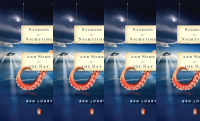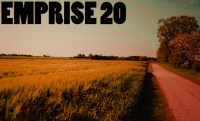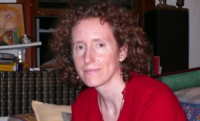An Interview
Your first two poetry collections, Stranger Air and Storm Crop, were published within weeks of each other earlier this year. What were some of the personal and professional challenges you faced due to this coincidence, and have any hidden blessings resulted from their simultaneous release?
Luckily, there weren’t any challenges. The fact that they were published so close together was purely coincidental. I had written the first manuscript as my creative thesis at the Vermont College of Fine Arts, and as soon as I finished it, I began the second book. Storm Crop, my second book, came together relatively quickly. I knew the formal structure that I wanted, the abecedarium, and everything I was beginning to articulate in my first manuscript was carried out more fully, but in a very different way, in the second. It simply took a bit longer to find a publisher for the first manuscript, and its publication date was pushed back a little. So the second book followed closely on its heels because of that circumstance. The blessings aren’t so hidden: I had two books published, so I can hardly complain about that. I guess the only other thing I could mention was my paranoia that my readers would get the publication order confused. I was very set on my books being viewed as a progression of thought, idea, and form.
Your early work often inhabits—at the risk of coining a phrase—imaginative thresholds between the real and surreal, or between the concrete and the imagined. Poets such as Wallace Stevens and Jorie Graham seem to let imaginative landscapes consume their poems as their careers progress, but even your most experimental work remains rooted in emotional necessity, be it love or sensuousness or grief. What relationship do you see between the tangible and intangible in your poems?
Thank you for seeing the emotional necessity in the poems. None of the poems work unless they come from a place of urgency, honesty, and longing. For me, the real and the imagined are inextricable in writing, as in life. Reality (at least one’s perception of it) and daydream exist interdependently. Reality and the dream world exist interdependently. Sometimes—and this happens more frequently as I get older—I confuse my memories and dreams. I think I remember an event from childhood or early adulthood, but it might have been dream. And as much as I admire the Objectivists and poets who rely less on metaphor, I cannot escape it. I mean, metaphor happens often enough anyway, even if it’s through juxtaposition of images. The mind will call up metaphors and associations and comparisons and interpretations of a given image. The real and the imagined are equally real to me—or nearly so. This occurs frequently enough that when I’ve tried to write more realistically or objectively, the work has inevitably fallen flat on its face. It works for other poets; it doesn’t work for me. It’s not that the perceived external world isn’t good enough or pleasurable enough or fearsome enough; it certainly is. But without my imaginative, sometimes surrealistic wanderings, my writing of that world deadens.
Stranger Air is also dominated by the natural world in both its iconography and metaphors, yet many of the poems are elegies. Do you think of yourself as an eco-poet, an elegiac poet, or both, or neither?
I would have answered this question differently a couple of years ago. I would have said that I am both an eco- and elegiac poet at that point. Now I’m not so sure—I’ve come to yet another place in my writing. But it is undeniable that I find myself writing elegies, whether for people, the earth, or its non-human inhabitants. But there’s a celebratory sense to many of the poems, too, which can only come from a direct confrontation with death and dying. And that’s in both books, so hopefully the poems extend past strict categories, and will continue to do so.
Stranger Air is mostly free verse, whereas Storm Crop is a book-length abecedarium, which is a highly rigorous and demanding form despite its elemental fixation on the alphabet. What role has form played in your maturation as a poet?
Form has always been important to me. But I discovered early on too much form suffocates me. Even if I’m writing a sonnet or villanelle, my brain is creaking with frustration. How can I BREAK this, I think. Although sonnets are more forgiving, there’s an elemental, bodily necessity for the words or phrases or rhythms not to fit into their assigned places. But the poems often have a nonce form, so there is formal shaping. So form as I determine it is really important. The abecedarium is a good example. The formal structure is the alphabet. I didn’t do too much C is for that, L is for that, before it started to wander away. I liked that aspect about the work—that it’s such a strict parameter, and then the brain bucked it and went about its business of truth (and form) finding in a freer, subconscious way. It was a relinquishing of control. Maybe that’s why I find a release in writing—because I’m such a control freak in real life I need the freedom of wandering in the poems. Too much control can be death to a poem, in my opinion. And maybe, too much control in a person’s daily life could be deathly, too. So form is very important—it just has to be altered or adjusted to fit what my body—it is, literally, a bodily affair (mind and body)—to what feels right, or more exactly, to what feels whole.
On Mystery
The worker across the street’s skull
deep in the house’s foundation,
belting opera in a bronze voice
that throbs, fades into a question’s
silent thicket. I’ve heard only vinyl
recordings of this sound, cannot
believe its source, unmistakable
under a third-shift sky. I mean
to penetrate, to be pricked by green things
so common I’ve forgotten their names.
Perhaps he’ll fix me with an eye
like a new punctuation. Where leaves turn
shades of lavender unaccounted for,
the sun bleats into an alien sky.
I amble slow as a neighbor towards
that flash of dusty hair to etch
forever the name homo sapiens
magicus operatus, but alas,
like the slow wink of mystery,
the song ceases, leaving
neither shovel nor pick,
only his long gap in the ground.from Stranger Air, © 2011, Mayapple Press
Not only do you frequently write in fragments in Storm Crop, but the book’s sense of the poetic line is radically different from your first collection: “A” is a diptych, “C” and “D” are written in verse-paragraphs, and “R” and “T” stretch expansively across the page. Does this reflect a natural progression of your voice, an episodic need that arose as the book evolved, or some combination of the two?
It was a natural progression of voice. I was very intuitive about the form, and didn’t write all the poems in alphabetical order. The second half of the book was more sequentially written, however, and the writing settled into that double-spaced, even-lined style. But that just happened. Those poems didn’t require the floating words and phrases, nor the big-mouth style of the verse paragraphs. I tried different arrangements, but they were unnecessary and artificial. But yes, the poems are very different than those in the first book, although there are three poems in the first book that anticipate the style demonstrated in the second. It’s very much an attempt to be as encyclopedic as possible—how was I to talk about politics, environmental and animal abuse, a love/hate relationship with humanity, the beauty of existence despite the constant of violence and trauma for all creatures—how could I talk about all that? Letting the subconscious take over instead of installing pre-calculated, over-controlled short lyrics was the path my brain was required to take. I think writing is really an act of listening, not just to what’s happening externally, but to what’s happening inside the body. The best writing happens out of necessity. Whether it succeeds or not is a secondary concern. Success will happen eventually.
“G,” one of the shortest and most elliptical lyrics in Storm Crop, ends with the lines, “Precision, my dear/isn’t everything.” Despite the mock-formality of your tone, this sentiment strikes me as a thesis of sorts for the entire book, yet as I reader I’m hesitant to embrace such a contrary notion. As a poet, what value do you place on imprecision and incompleteness?
Well, it’s paradoxical, isn’t it? But I really believe that speaking, that uttering one’s truths/beliefs/fears/obsessions is paramount. The ideas might be revised, they might later be proven by the individual (and/or others) to be wrong—this is the age-old issue of flux. Is precision even possible? Sure. For instance, when discussing death. We only leave one way, after all. But there is a great deal of room, as a person’s life progresses, for changes in point of view and experience. The most important thing is to speak. To make the attempt. The rest will follow—precision is the desired goal, yes—to say it right, to get it right. To cut that deeply into the human psyche that no one can dispute the truth of what one is saying, or at least have it rattle settled beliefs. But a poem, or speech, or conversation isn’t always going to reach that. But I have to keep trying. And that seems to me to be incredibly political and empowering. To remain silent is a death.
In my newer work, which, by the way, initially started out as a project of one-line poems, I wanted to be pithy, precise, truthful, wise, all that. Maybe I’ll get there one day. But what happened instead is a mixture of truths, sentences, phrases, words, fragments. After playing around with order, I realized they worked in ANY order. This is not a new concept, but that’s what happened. Sentences like “death is nothing more than a lack of communication” seem relevant here. Or in some newer lyric work the idea that even the most complete lyric or narrative is fragmentary—there is always something larger at work outside, experientially, pluralistically. So what exactly is whole? A novel can feel whole, and so can a poem. But it’s only one piece of the conversation, after all. So, the value I place on imprecision and incompleteness? Well, I don’t fear it. I hope that I can make shots that are precise, but it’s more important to try the shot at all. And incompleteness? Well, there’s something magical, beautiful, and disturbing about phrases or sentences that inhabit their own space, their own meaning. I think a poem should create a new space—if it doesn’t, there might be something missing. And a fragment can still fulfill that. We are made of fragments and wholes, after all—of memory and experience, of conversations interrupted or overheard, of glimpses, whether passing by houses while driving along the turnpike or brief glimpses into others’ personal lives. For me, some beautiful orphan of a line is often enough. Not always—I like more complete, traditional lyric and narrative poems and prose poems, too. But there’s room for everything—everything!
So lastly, is precision important? Absolutely. I’m trying to be precise all the time, actually. I just know it’s not possible to carry it out. Even the idea that I was writing a book of one-line poems—that’s pretty strict. But now I have this different beast in front of me, that works well in a different way, and that’s that. Now I need a computer program that will shuffle my words and phrases so an entirely different “book” will be displayed at one click of the mouse. Otherwise this little project might have to find a different form—a deck of cards or something. We’ll see. Will I ever complete my one-line poems? I have no idea. But I plan to keep trusting that there is meaningful work along the way.
Who were your earliest influences? Do you feel that after two published collections, you can still feel the gravity of influence in your poems?
Dylan Thomas, Gerard Manley Hopkins, Jorie Graham, Neruda. There’s a group, eh? I have consistently felt, though, as I’ve become better read, that I’m not a person who gravitates towards a few poets. I take something from every collection I read, and that can mean what I like, what I plan to incorporate or adjust into my work, or what I hate. Yet I never write anyone off because I recognize in five or ten years time, their work might resonate with me. So yes, influence is felt, but widely. Plath, Oppen, Reznikoff, Armantrout, Edson, Akhmatova, Carson, Valentine, Niedecker, Vicuña, Pavlova…there are too many to list. Style, phrasing, uniqueness—there’s always something to enjoy, learn, and study from people who write so differently from myself. The gravity of influence is always there in terms of what I find intriguing, skillful, idiosyncratic, surprising, shocking, mysterious—what I learn from other poets may not present itself overtly in my work, but it surely informs it.
What sinew binds your roles as a mother, a teacher, and a poet? To what degree do these roles inform each other?
I’m not yet sure entirely how being a mother informs the poetry. I simply don’t have enough distance from these early years of parenting to be able to reflect upon it—there is less writing occurring right now, and more living. There is chaotic, blissful, euphoric love happening all the time—not exactly the time when I can reflect well on what’s happening. I trust the poems will happen later pertaining to motherhood, but again, that elegiac element keeps recurring. I do have some purely child-related poems, but several of them cannot remove themselves from the fact that at the same time this unparalleled time of happiness was happening, my father-in-law was dying from Lou Gehrig’s disease. My son and Dan were mirroring each other in reverse. As Kai began to walk, Dan began to lose his ability to do so, for instance. It was a bizarre compartmentalizing of joyful and tragic experiences at times, and when events intermingled, they were painful and bittersweet in ways I can only begin to articulate. Much has happened over the past year which I need time to absorb. And finally, I think—because I am not a patient person—the necessity and permission of patience is beginning to happen.
As for teaching, it’s important to note that I’m a high school teacher. So being a mother has heightened my understanding of the children who enter my classroom, and it helps me better understand the parental perspective, too. It’s helped me empathize more with the kids and their various issues and struggles, and what that might mean for their parents. Yes, I think my level of empathy has increased. And if there’s any kind of connective tissue between the three roles you mention, that’s the most important.
—-
Stacie Leatherman’s two collections of poetry are Stranger Air (Mayapple Press) and Storm Crop (BlazeVOX), both published earlier this year. Her poems have appeared in New American Writing, Interim, Indiana Review, Cricket Review Online, Barrow Street, Caketrain, Diagram, Crazyhorse, isotope, BlazeVOX, elimae, SUB-LIT, Packingtown Review, The Florida Review, Many Mountains Moving and The Southeast Review, among others. Leatherman earned her MFA from the Vermont College of Fine Arts and blogs things literary and ecopoetic at stacieleatherman.com.









